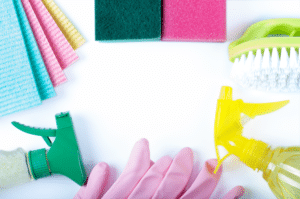 Green is a word that is used daily in our current world. Companies are geniusly employing green methods to their marketing and practices, labeling their businesses or methods as green or green or ecofriendly. The word green has come to mean life, renewal, natural, pure, clean, good earth, and other such adjectives to people, so using anything labeled “green” tends to be immensely popular. Consumers decide that their entire lives, bodies and environment, be natural, healthy, and pure, so green cleaning products are often the product of choice, versus the mainstream products containing chemicals that could possibly be more harmful than helpful. It is tempting to think that one cannot get too much of something labeled green and that there could be no harmful ingredients contained in such products. However, there are green cleaning products that should never, ever be mixed, and that should remain in the original containers in which they are purchased, so the original labels are accessible and studied carefully for instructions and warnings concerning each product. When using green cleaning products, ingredients contained within are often advertised or touted as non-toxic, pure, natural, and biodegradable, but are subject to very little regulation. Therefore, the green cleaning product consumer should seek education and professional expertise when making decisions on what products are safest and what products should not be mixed under any circumstances.
Green is a word that is used daily in our current world. Companies are geniusly employing green methods to their marketing and practices, labeling their businesses or methods as green or green or ecofriendly. The word green has come to mean life, renewal, natural, pure, clean, good earth, and other such adjectives to people, so using anything labeled “green” tends to be immensely popular. Consumers decide that their entire lives, bodies and environment, be natural, healthy, and pure, so green cleaning products are often the product of choice, versus the mainstream products containing chemicals that could possibly be more harmful than helpful. It is tempting to think that one cannot get too much of something labeled green and that there could be no harmful ingredients contained in such products. However, there are green cleaning products that should never, ever be mixed, and that should remain in the original containers in which they are purchased, so the original labels are accessible and studied carefully for instructions and warnings concerning each product. When using green cleaning products, ingredients contained within are often advertised or touted as non-toxic, pure, natural, and biodegradable, but are subject to very little regulation. Therefore, the green cleaning product consumer should seek education and professional expertise when making decisions on what products are safest and what products should not be mixed under any circumstances.
Vinegar is known as a natural product that has hundreds of uses. However, what people often fail to understand is that it is a very acidic product that should not be mixed with many other products. Vinegar should never be mixed with baking soda, with vinegar being very acidic and baking soda being basic. The effect of each of these products actually becomes neutralized when the two products are combined, and a dangerous explosion can also occur. Mixing the two in a closed-up container will make an explosion every more likely.
Vinegar should also never be mixed with hydrogen peroxide, as these two products will create something called peracetic acid. This acid, in very concentrated forms, can be dangerous to the lungs, throat, nose, and eyes, and can cause skin damage. Additionally, vinegar should not be mixed with Castile soap, with the vinegar again being acidic and the Castile soap basic like baking soda. The combination of the acidic vinegar and the Castile soap will just make a muck that is white and curdled, but each ingredient on its own is useful on its own. The Castile soap is best used alone for the wash cycle, and vinegar by itself in the rinse cycle. Finally, vinegar does not mix well with bleach unless a toxic, dangerous gas is the goal. Such a damaging gas could injure the lungs or eyes, and since bleach is not a chemical found in nature, and produces toxic byproducts, the green cleaning consumer should avoid bleach as a rule for the good of people and the environment.
Bleach, again not a natural product found in nature, should not be mixed with rubbing alcohol or ammonia either. Mixing rubbing alcohol and bleach will create hydrochloric acid and chloroform, which could cause the user to pass out, while being toxic. Ammonia with bleach will cause a toxic gas called chloramine, which could bring the user problems with breathing and with chest pain.
Disinfectants and detergents, green or not, can create dangerous fumes and acidic reactions, and chlorine gas can be the result of mixing drain cleaners from different brand names and bottles. The valuable lesson from all this information is that mixing green products with green products, or green products with any products, can net harmful results. In fact, the mixture of certain products can cause unwanted symptoms such as coughing, wheezing, chest pain, eye watering or damage, skin irritation, eye irritation/burning, throat irritation, a runny nose, shortness of breath, and nausea or vomiting. Such effects, chemical reactions, explosions, and/or damage can injury or prove fatal to a user who started with the intention of using natural, eco-friendly cleaning products for the good of their home and world. Sticking to a green product’s intended use is the safest, most environmentally and health conscious thing to do for the green consumer, always paying close attention to the ingredient list and product labels.
